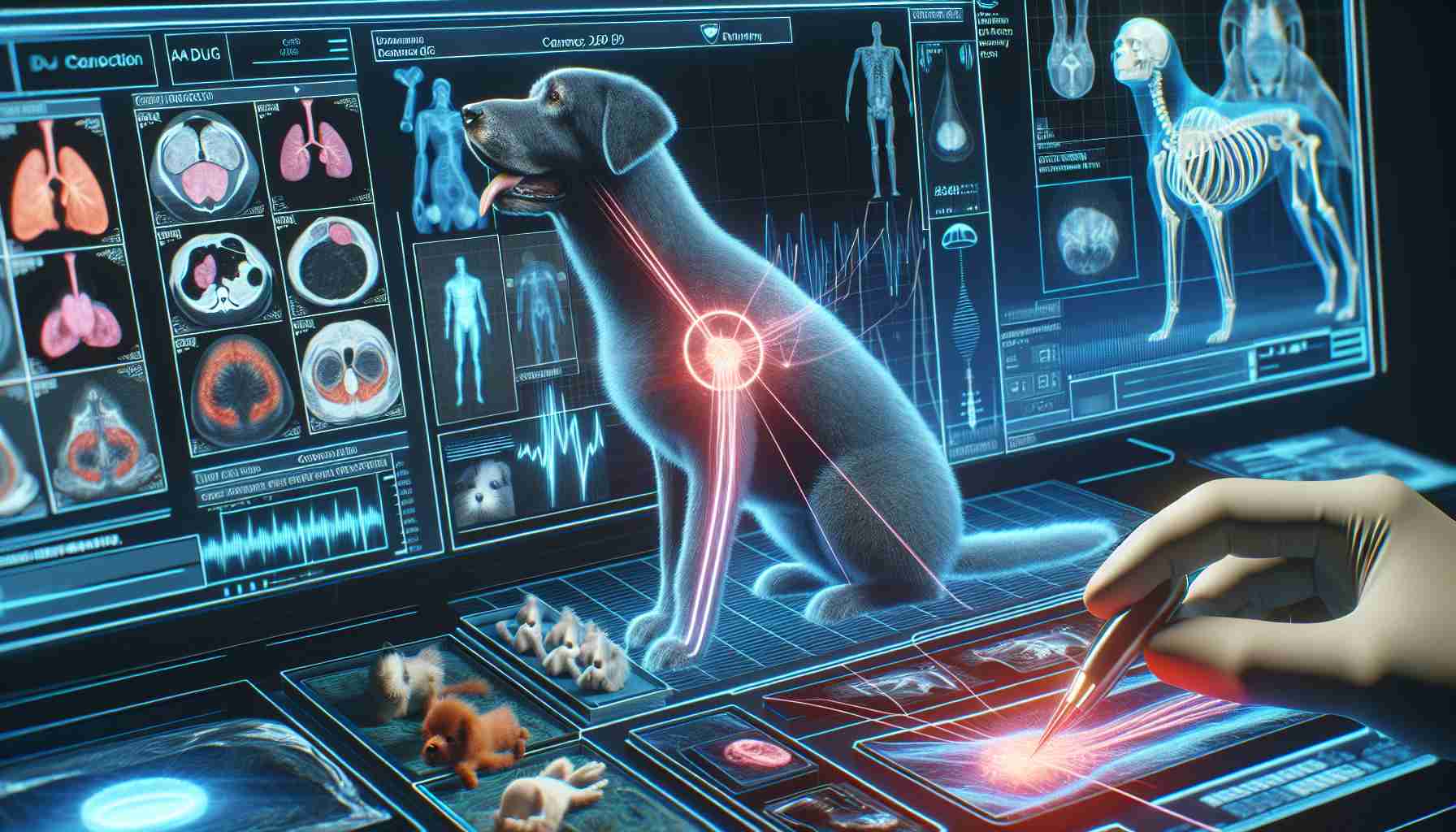Cancer ranks as the leading cause of death for pet dogs worldwide. However, an innovative study is now leveraging the power of artificial intelligence (AI) to revolutionize early cancer detection in dogs.
This groundbreaking approach specifically targets diffuse large B-cell lymphoma (DLBCL), which is the most common and deadliest type of cancer in canines. Scientists at the University of Minnesota are spearheading the research, utilizing a novel strategy called “test and intervene” that harnesses AI to analyze DNA fragments in blood samples. By doing so, they hope to identify dogs with a higher risk of developing DLBCL.
The outcomes of this study are expected to provide pet owners and veterinarians with intervention plans tailored to reduce the risk in dogs deemed more susceptible. This would mark a significant development in the early detection and prevention of canine lymphoma, ultimately leading to improved treatment outcomes and preserving the bond between pets and their owners.
Financial support for this project is being provided by the Morris Animal Foundation and the Golden Retriever Foundation. Both organizations are committed to advancing scientific breakthroughs and improving the lives of animals. The partnership between these foundations underscores their dedication to research on canine lymphoma and its impact on dogs, their owners, and society at large.
“We are honored to continue our partnership with the Golden Retriever Foundation and extend the impact of the Golden Retriever Lifetime Study through this important research on canine lymphoma,” stated Kathy Tietje, Chief Program Officer at the Morris Animal Foundation. This collaboration highlights the collective effort to drive progress in cancer detection and prevention in dogs.
Christine Miele, President of the Golden Retriever Foundation, echoed this sentiment, expressing enthusiasm for being part of the LyRA project and maintaining an ongoing partnership with the Morris Animal Foundation. “Lymphoma sadly affects about one in eight dogs, resulting in both financial burden and emotional loss. We eagerly await the day of early detection and the application of preventive measures and treatment,” said Miele.
To develop the test for early cancer detection in dogs, the researchers plan to extensively evaluate a diverse range of dogs and analyze samples from the Morris Animal Foundation’s Golden Retriever Lifetime Study. This comprehensive investigation will enable them to identify DNA patterns in the blood that emerge prior to the development of cancer.
This cutting-edge research in utilizing AI to detect cancer in dogs represents a significant stride toward veterinary medicine’s capabilities. By identifying dogs at higher risk for DLBCL at an early stage, interventions can be tailored to mitigate the risk and increase the chances of successful treatment.
FAQs
What is diffuse large B-cell lymphoma (DLBCL)?
DLBCL is a type of cancer that affects both humans and dogs. It is characterized by an abnormal growth of B cells, a type of white blood cell responsible for producing antibodies. DLBCL is the most prevalent and lethal form of cancer in dogs.
How does the “test and intervene” strategy work?
The “test and intervene” strategy involves the use of artificial intelligence (AI) to analyze DNA fragments in blood samples from dogs. By identifying specific DNA patterns that appear before the development of cancer, the researchers can identify dogs at a higher risk of diffuse large B-cell lymphoma (DLBCL). Based on this information, tailored intervention plans can be created to reduce the risk in susceptible dogs.
What organizations are supporting this project?
The Morris Animal Foundation and the Golden Retriever Foundation are providing financial support for this groundbreaking research. The Morris Animal Foundation aims to improve animal health through scientific advancements, while the Golden Retriever Foundation focuses on the health and well-being of Golden Retrievers. The collaboration between these foundations highlights their commitment to canine lymphoma research.
The innovative study discussed in the article focuses on detecting cancer in dogs, specifically diffuse large B-cell lymphoma (DLBCL), using artificial intelligence (AI). DLBCL is the most common and deadliest type of cancer in canines. By analyzing DNA fragments in blood samples from dogs, AI can identify specific patterns that indicate a higher risk of developing DLBCL. This allows for early detection and tailored intervention plans to reduce the risk in susceptible dogs.
This research has the potential to revolutionize cancer detection and prevention in dogs, leading to improved treatment outcomes and ultimately preserving the bond between pets and their owners.
Financial support for this project is being provided by the Morris Animal Foundation, an organization dedicated to advancing scientific breakthroughs in animal health, and the Golden Retriever Foundation, which focuses on the health and well-being of Golden Retrievers. The collaboration between these foundations demonstrates their commitment to canine lymphoma research and improving the lives of animals.
To develop the test for early cancer detection in dogs, the researchers plan to extensively evaluate a diverse range of dogs and analyze samples from the Morris Animal Foundation’s Golden Retriever Lifetime Study. This comprehensive investigation will enable them to identify DNA patterns in the blood that emerge prior to the development of cancer.
The use of AI in detecting cancer in dogs represents a significant advancement in veterinary medicine. By identifying dogs at higher risk for DLBCL at an early stage, interventions can be tailored to mitigate the risk and increase the chances of successful treatment.
Related Links:
Morris Animal Foundation – Official website of the Morris Animal Foundation, providing information about their research and initiatives in animal health.
Golden Retriever Foundation – Official website of the Golden Retriever Foundation, offering resources and support for Golden Retrievers’ health and well-being.
The source of the article is from the blog radiohotmusic.it

